#Pierre Mignard
Explore tagged Tumblr posts
Text

Portrait of a Lady in allegorical guise, holding a dish of pearls (detail)
Pierre Mignard (French, 1612-1695)
#traditional art#art#oil on canvas#painting#art detail#paintings#17th century art#17th century#pierre mignard#art history#french art#frostedmagnolias
3K notes
·
View notes
Text

Pierre Mignard I
#pierre mignard i#pierre mignard#art#artwork#fine art#fineart#painting#art history#history of art#women in art
25 notes
·
View notes
Text

Cronos corta las alas a cupido:
Este cuadro lo pinto Pierre Mignard en francia
Y esta es la historia espero que te guste tanto como a mi:
A Cronos (El dios griego y padre del tiempo en el Renacimiento) Mignard lo ha pintado musculoso, con barba y el reloj de arena a sus pies. Sostiene con fuerza a Cupido (El amor), cuyas flechas han caído al suelo lo que simboliza que ha sido vencido, y le recorta las alas para que no vuele demasiado alto.
Esta pintura así simboliza que el tiempo vence al amor.
Si analizamos esto detenidamente, nos daremos cuenta de que el tiempo no está venciendo al amor, si nos damos cuenta, Cronos sostiene al amor cómo a un niño malcriado que recibe un correctivo, las flechas no están tiradas o rotas... están guardadas en su carca y recargadas con cuidado.
Cronos le corta las alas a cupido para que ponga los pies en la tierra, que es una metáfora sobre usar la razón, lo que significa que no está venciendo al amor, simplemente lo vuelve un amor realista, un amor que tiene alas pero no pierde el suelo.
A mí parecer aquí lo correcto sería decir el tiempo transforma el amor y lo vuelve más centrado, más maduro.
Lo podemos ver en las parejas que ya después de muchos años juntas descubren lo que está después del estrés positivo y de la idealización del otro, que es la aceptación del otro tal y como es, un amor que no estiliza a la pareja para amarla sino que descubre las partes más oscuras de su pareja y aprende a amarlas también y por tanto ama con-razón (no por nada se llama corazón). 😉
#pensamientos#sabiduria#frases#filosofía#amor propio#crecimientopersonal#acciones#adversidad#aceptacion#cronos#cupido#pintura#amor#alas#analogia#reflexiones#realidad#reflexión#Pierre Mignard#francia#dios#renacimiento#enfoque#entendimiento#cultura#wisdom#thoughts#historia#history#maduro
21 notes
·
View notes
Text
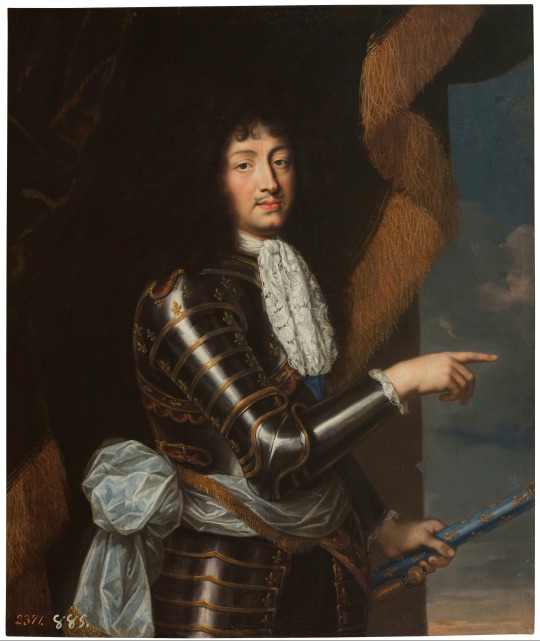
Louis XIV of France. Circle of Pierre Mignard.
#pierre mignard#royaume de france#maison de bourbon#louis xiv#roi de france#le roi soleil#roi de france et de navarre#vive le roi#versailles#museo del prado#in armour
24 notes
·
View notes
Text

Lady in the Park by Pierre Mignard, 17th century
#new post#historical fashion#historical#pierre mignard#florals#flowers#17th century fashion#17th century#french painting#french painter#versailles#landscape#artwork#art#old paintings#old art#painting#painting of the day#aestethic#fashion history#garden#pink#mignard#don't mind me
8 notes
·
View notes
Text

~1688, Pierre Mignard, San Juan Bautista
#Petrus Mignard#Pierre Mignard#Ioannes Baptista#San Juan Bautista#saec. XVII#1688#pictura#Museo Nacional del Prado#Matriti#ZRDZHER
45 notes
·
View notes
Text
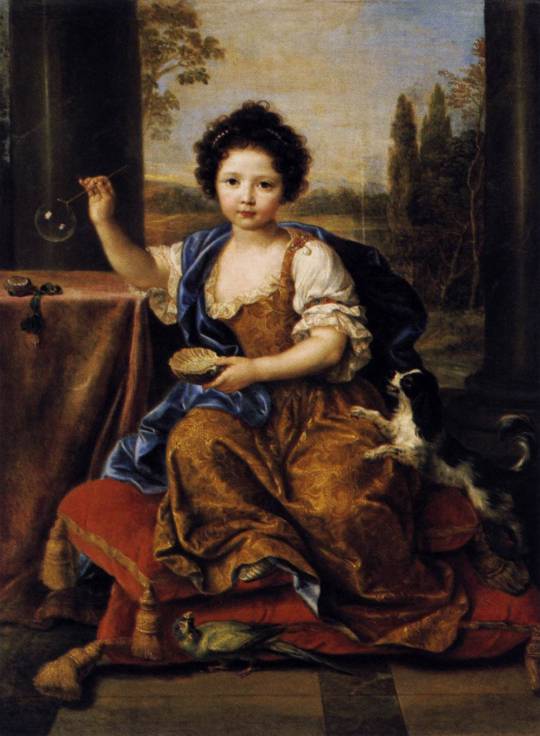
"Louise-Marie de Bourbon, dite Mademoiselle de Tours; La fillette aux bulles de savon"
By Pierre Mignard
Oil Painting, 1681.
Château de Versailles.



PORTRAIT SUBJECT
La fillette aux bulles de savon, or the commonly found English title, Girl Blowing Soap Bubbles, is a portrait of innocence during the Franco-Dutch War.
The child shown is Louise-Marie de Bourbon, the daughter of the Sun King, Louis XIV, and his Maîtresse-en-titre, Françoise-Athénaïs de Rochechouart (Madame de Montespan). I'm sorry, I don't know why they popped off with the names like that when they're planning to reuse Marie and Louis fifty times over ptdr. Louise-Marie, affectionately known as Toutou, was an illegitimate birth (1674), later legitimized by her father when she was around two years old. She held the title of Mademoiselle de Tours from then until her untimely death in 1681.
According to sources, Mignard's painting of the six-year-old girl was finished posthumously. But, her innocence is held delicately, frozen in time on canvas.

THEMES OF CHILDHOOD INNOCENCE (TL;DR: YAPANESE)
Mignard's choice to paint Louise-Marie as an actual child was uncommon for the time (even centuries later, believe it or not; maybe not so good examples, but for argument-sake: Louis XV by Hyacinthe Rigaud, Mariana Victoria of Spain by Nicolas de Largillierre, Phillip II, Duke of Orléans, Reagent of France by Largillierre, and Élisabeth Charlotte d'Orléans, "Mademoiselle de Chartres" by Largillierre -- apologies for throwing you strays, man, I'm trying to finish writing this and your children portraits were on the same website next to each other x), as young royalty are painted either as babies (unbreeched/baptize gown) or as tiny adults (fixed in uncomfortable poses and wearing clothes a monarch would), no in between. Here, Louise-Marie is playing with bubbles, her dog jumping towards it, and she looks carefree, still with chubby cheeks of rose. It doesn't help much that children were seen as heirs to the family fortune, especially during a time when parents had multiple kids due to illness (premature death) and bringing in income (need I explain more... *cough cough* coal mines... a bit anachronistic, sorry breaker boys, some other time we'll discuss y'all).
A painting such as this one, showing a realistic human experience from a royal status and that of a child BEING a child, innocence still intact, is quite important, even in today's form. We take childhood for granted, and kids are forced to grow up despite having more rights now than before. It can be a portrait to remind us that innocence is vital (a lack of childhood is detrimental as the experience is needed in order to mature mentally and emotionally when entering the teen and adult stages of life), but also that we as humans weren't so different from back then (sure, you can claim we bathe more than they do despite your husband still not washing his ass, but my heavens, did the thought 'wait, they had bubbles back then' ever occur to you?).
Genuinely, I was going to pull a La Muse Verte (the post where I briefly explained the history of absinthe) and go into the history of bubbles... because you gotta admit, that'd be fun for the both of us. However, delving into the background and theme of this painting became more heartbreaking for me. The bubble idea isn't gone, but it'll be postponed as a full history lesson post (and, yes, Mignard's painting of the immortalized Toutou will be recycled).

FURTHER READING (EXTRA SYMBOLISTIC DETAIL)
Plenty more symbolism is present, but I highly recommend you all check out L'Art en Tête's in-depth article on Mignard's beautiful portrait. I did regurgitate some of the author's points in this because I thought they were brilliant, and you can tell they have an art-history degree, so I'm begging you to go over there for more detail if interested!

#art#painting#oil painting#artwork#history#french#french art#17th century#1600s#1600s art#late 1600s#17th century art#baroque#Pierre Mignard#Château de Versailles#versailles#Royalty#French history#louis xiv#sun king#symbolism#louise-marie#mademoiselle#art history#house of bourbon#early modern period#kingdom of france
10 notes
·
View notes
Text

"Time Clipping Cupid's Wings" by Pierre Mignard. 1694
1 note
·
View note
Text
Some post Louis XIV fashion -
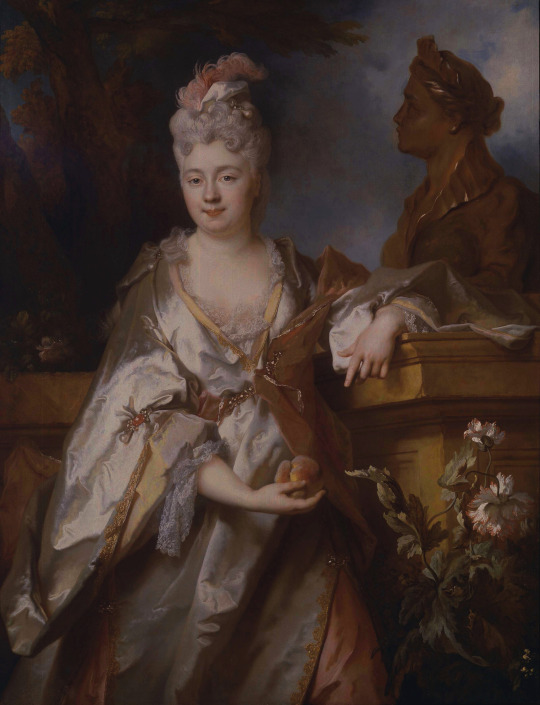
1715 Jeanne-Cecil Le Guay de Montgermon, three quarter length in a white satin robe with gold trimming and a ruby and pearl brooch by Nicolas de Largillière (Robilant & Voena, specific location ?). From their Web site; From their Web site; fixed spots in background with Photoshop and increased color saturation. 2721X3532.

1716 Mary Josephine Drummond, condesa de Castelblanco by Jean Baptiste Oudry (Museo del Prado - Madrid, Spain). From their Web site;fixed spots w Pshop 2045X2717.

ca. 1715 Louise Adélaïde de Bourbon by Pierre Gobert (Châteaux de Versailles et de Trianon - Versailles, Île-de-France, France) photo - Gérard Blot. From Réunion des Musées nationaux; enlarged by half 726X956.

ca. 1715 Sarah Lascelles (1656/1659–1743), Mrs Joshua Iremonger II, then Mrs Christopher Lethieullier by Michael Dahl I (Uppark House and Garden - South Harting, Petersfield, West Sussex, UK). From bbc.co (now artuk.org) 652X800.
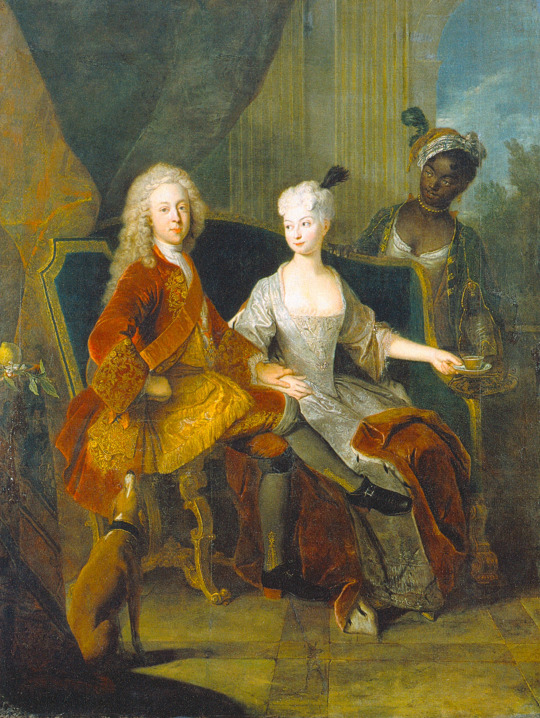
ca. 1716 Friedrich Ludwig of Württemberg and his wife Henriette Marie of Brandenburg-Schwedt by Antoine Pesne (Staatliches Museum Schwerin - Schwerin, Mecklenburg-Vorpommern, Germany). From Wikimedia; removed spots and linear and splotch flaws with. Photoshop 2078X2763.
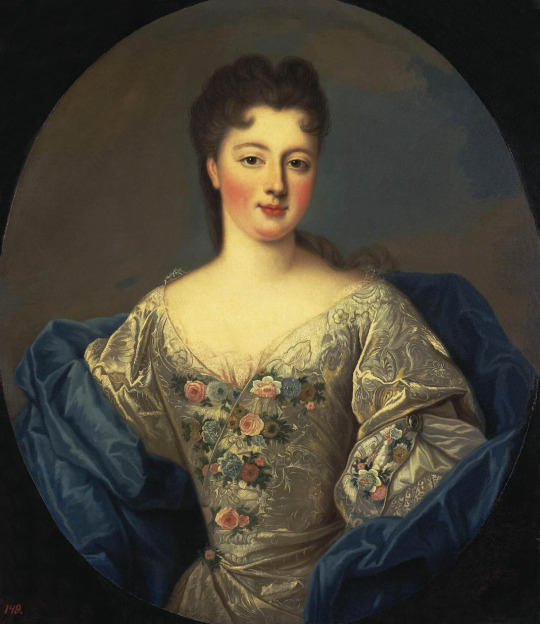
ca. 1716 Marie Louise Adélaïde d'Orléans the future Abbess of Chelles, daughter of the Regent of France by Pierre Gobert (Domaine de Sceaux - Sceaux, Hauts-de-Seine, Île-de-France, France). From Wikimedia; fixed spots w Pshop 1069X1235.

ca. 1717 Madame de Ventadour by Pierre Mignard (Châteaux de Versailles et de Trianon - Versailles, Île-de-France, France). From Wikimedia 1516X2000.The abundant lace ruffles on her sleeves point to the future while the headdress looks back to Fontanges and cleft coiffures.

Lady, said to be Marie-Elisabeth Le Fèvre de Caumartin (d. 1717) by Nicolas de Largillière (Sotheby's - 13Jun07 auction Lot 56). From their Web site; fixed obvious spots & cracks w Pshop 2396X2866.
#1710s fashion#late Baroque fashion#Rococo fashion#Georgian fashion#Louis XV fashion#Nicolas de Largillière#Jean Baptiste Oudry#Michael Dahl#Antoine Pesne#Pierre Gobert#Pierre Mignard
7 notes
·
View notes
Text

Circle of Pierre Mignard (1612–1695), Portrait of a gentleman, traditionally said to be Jean-Baptiste Lully, 17th century, oil on panel, 56.3 x 44.7 cm, Christie's, live auction 3050, lot 130
#LULLY?!?!?!#i mean it's probably not really him#overall too different from that more famous and probably more certainly identified portrait of him which is also by one of the Mignard#especially reguarding the chin and eyebrows I'd say#and also this guy's way too pretty#but wouldn't it be fun#pierre mignard#jean-baptiste lully#jean baptiste lully#17th century#portrait#male portrait#baroque#French baroque
1 note
·
View note
Text
07 works, PORTRAIT OF A LADY, François d'Aubigné, the secret wife of Louis XIV, with Footnotes. #136
Philippe VignonFrançoise d’Aubigné, Marquise de Maintenon (1635-1719), c. 17th centuryOil on canvasheight: 113 cm (44.4 in); width: 106 cm (41.7 in)Unidentified location Françoise d’Aubigné, known first as Madame Scarron and subsequently as Madame de Maintenon was the last great female presence in the life of Louis XIV… Please follow link for full post

View On WordPress
#Art#Artists#Biography#Feminine#Fine Art#Françoise d&039;Aubigné#Georgine Gerard#History#Louis de Mornay#Philippe Vignon#Pierre Gobert#Pierre Mignard#PORTRAITOFALADY#Thérèse de Champ Renaud#Zaidan
0 notes
Text

Pierre Mignard I
#pierre mignard i#pierre mignard#art#artwork#fine art#fineart#painting#art history#history of art#christ#ecce homo
14 notes
·
View notes
Text
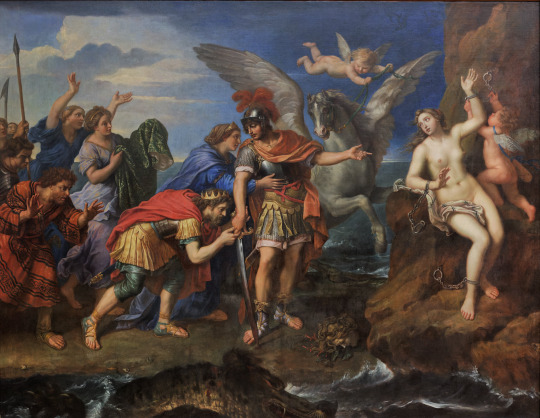
Pierre Mignard (French, 1612-1695) Le Délivrance d'Andromède, 1679 Musée du Louvre, Paris
#Pierre Mignard#french#french art#greek mythology#mythology#cradle of civilization#mediterranean#art#fine art#european art#classical art#europe#european#oil painting#fine arts#europa#andromeda#andromede#le delivrance d'andromede
39 notes
·
View notes
Text

Claudine Françoise Mignot (1624-1711) By Pierre Mignard.
#pierre mignard#Vasa dynasty#kingdom of poland#królestwo polskie#morganatic wife#Claudine Françoise Mignot#John II Casimir Vasa#royaume de france
6 notes
·
View notes
Text

The Children of the Duc de Bouillon by Pierre Mignard, 1647
#pierre mignard#mignard#french art#french painting#french painter#new post#historical fashion#old paintings#17th century#17th century fashion#1640s#portait#group portrait#children's fashion#nobility#aristocracy#aristocratic#dogs in paintings#dogs in art#family portrait#family
7 notes
·
View notes
